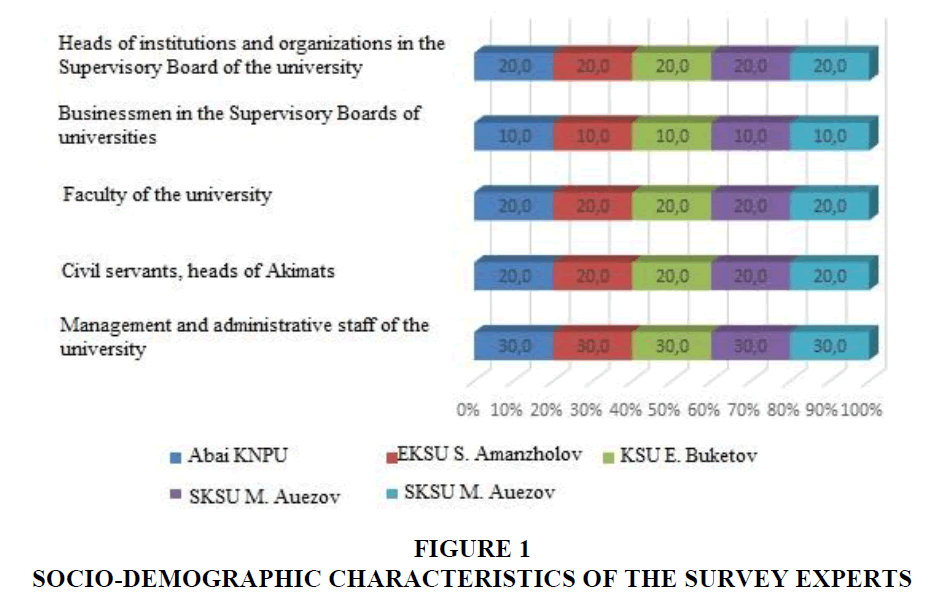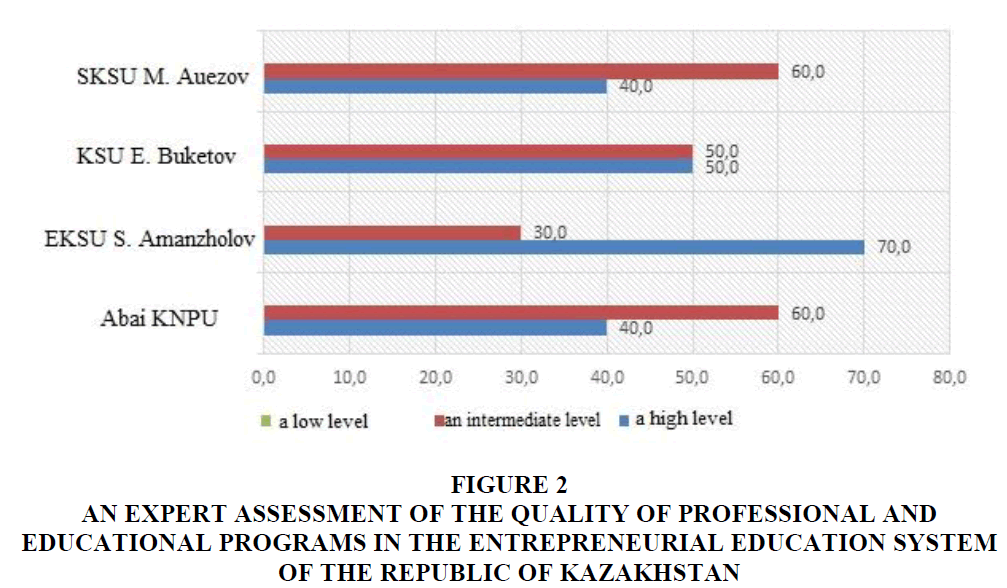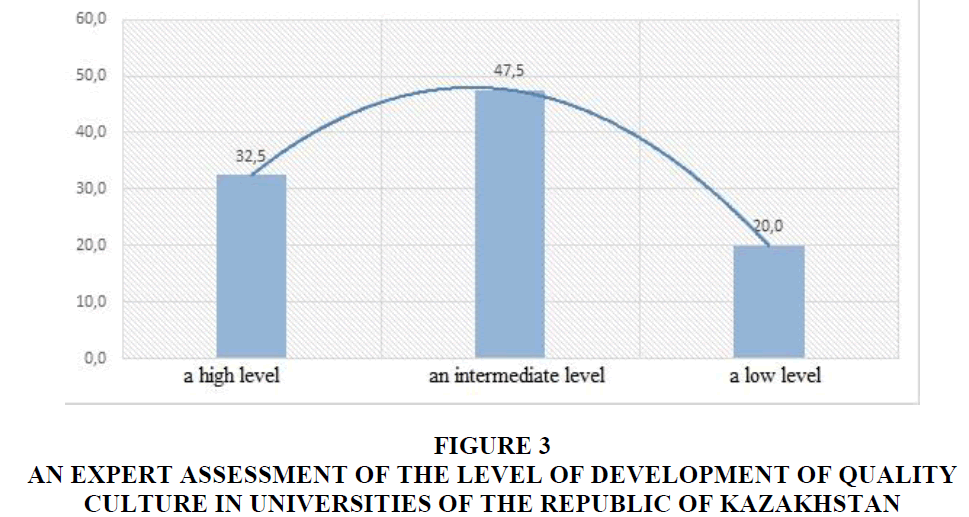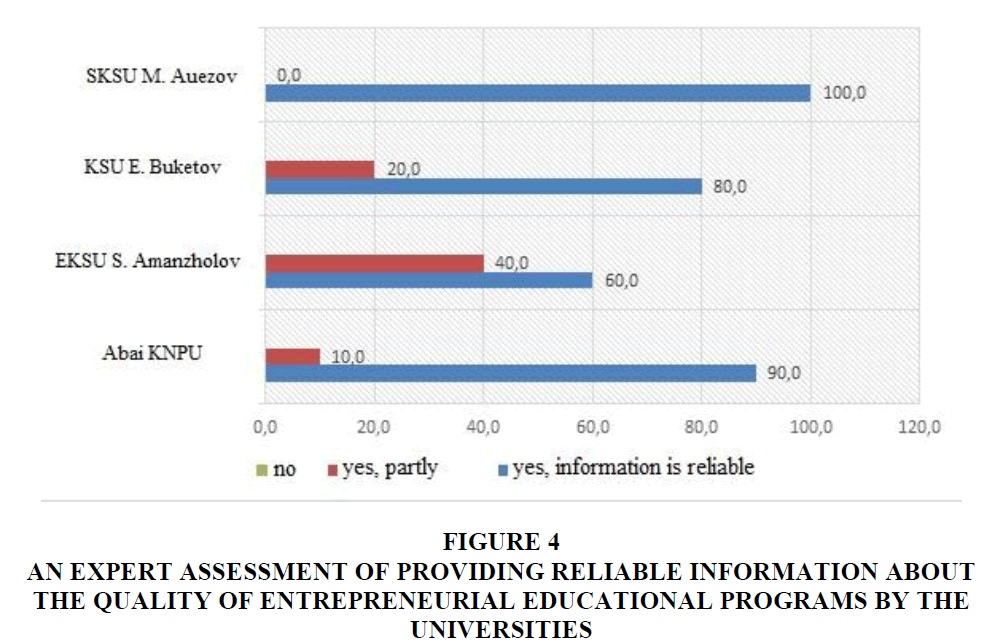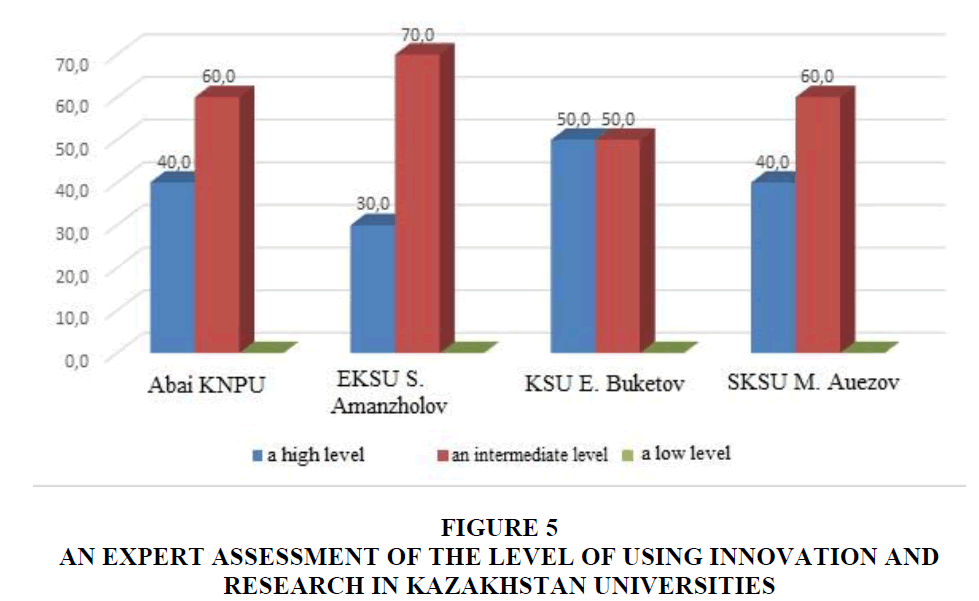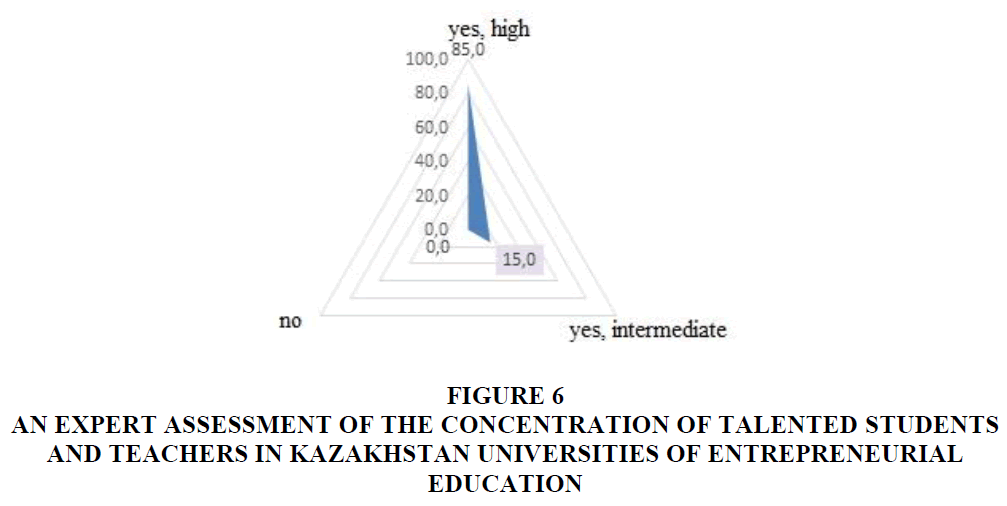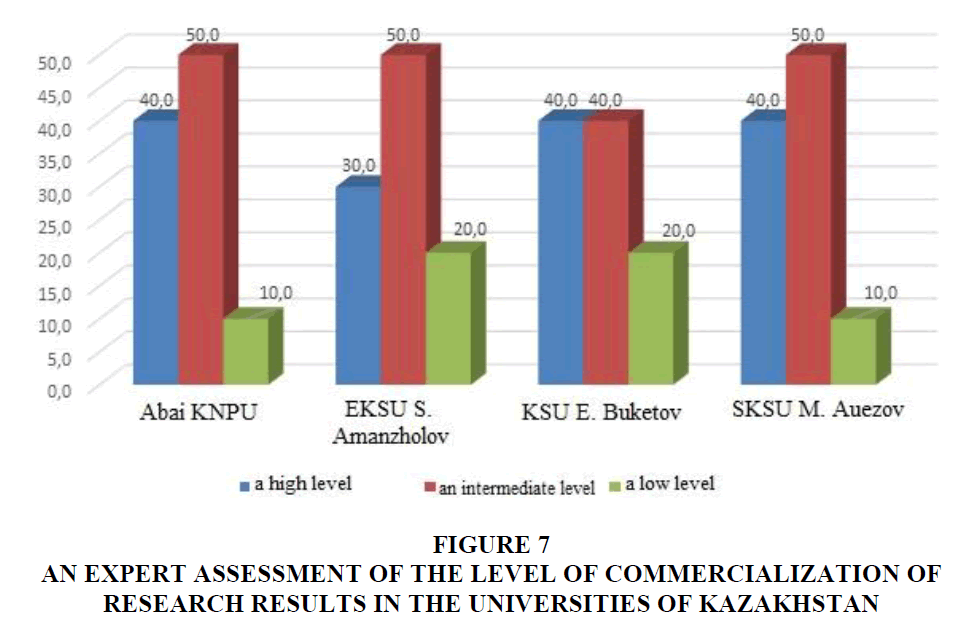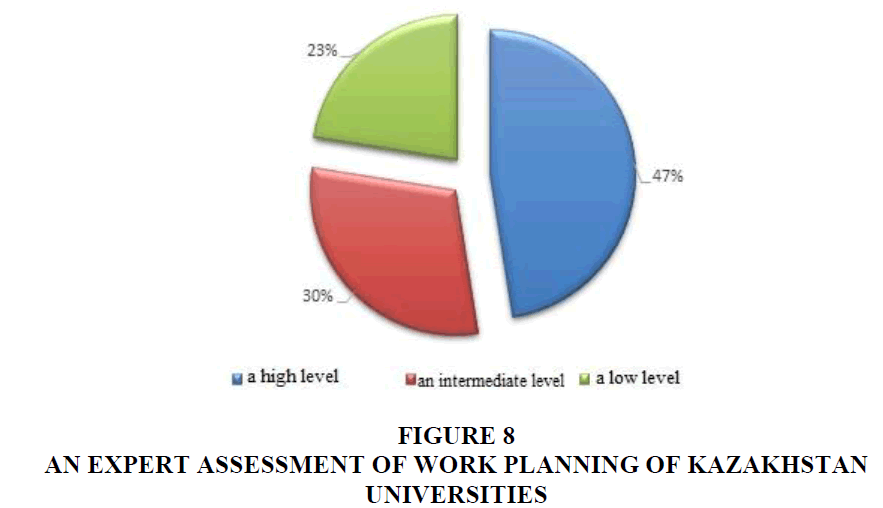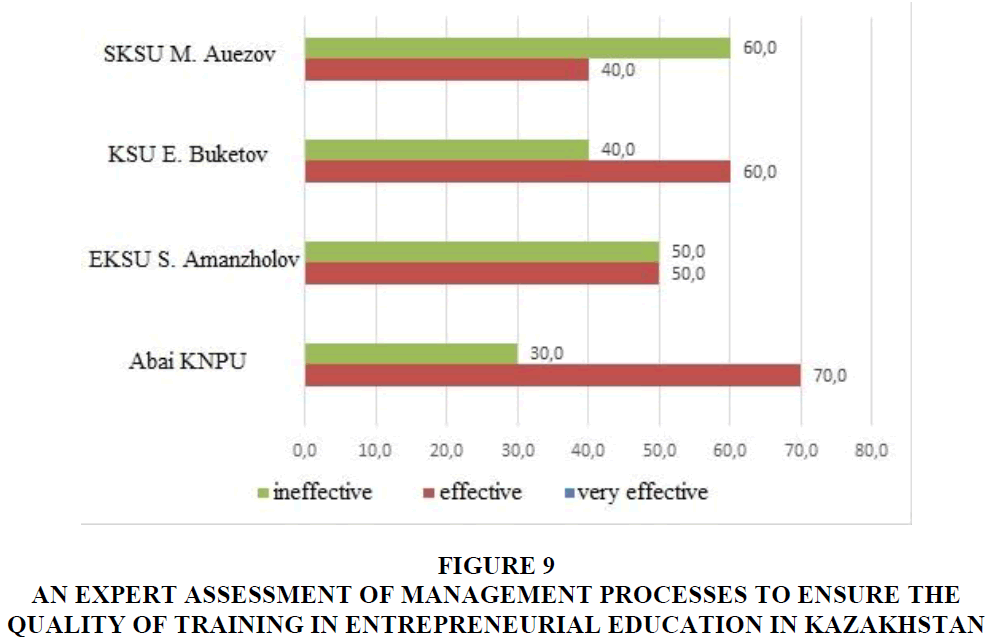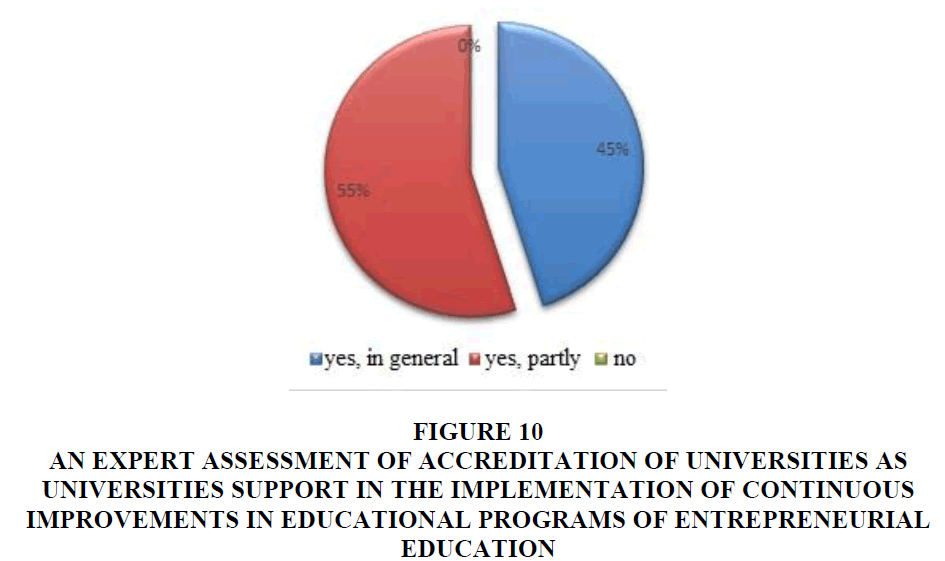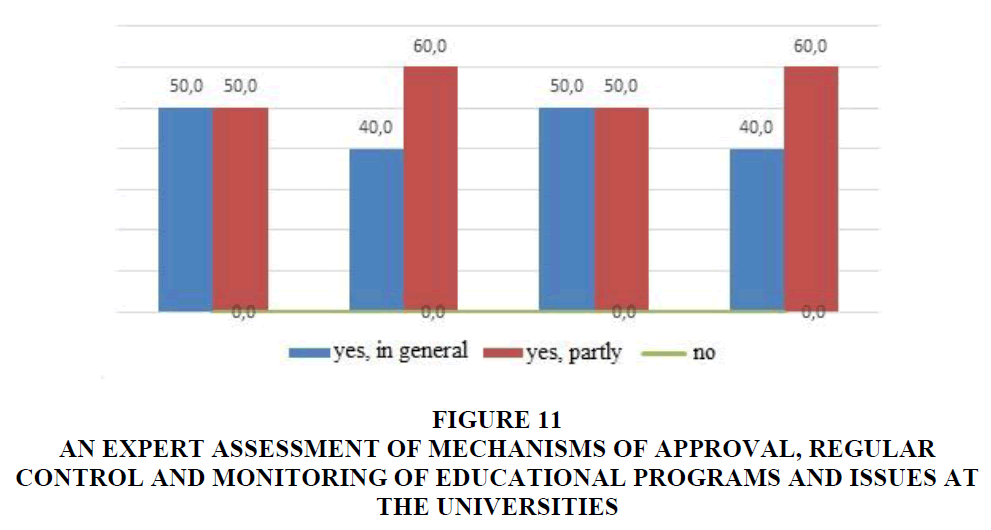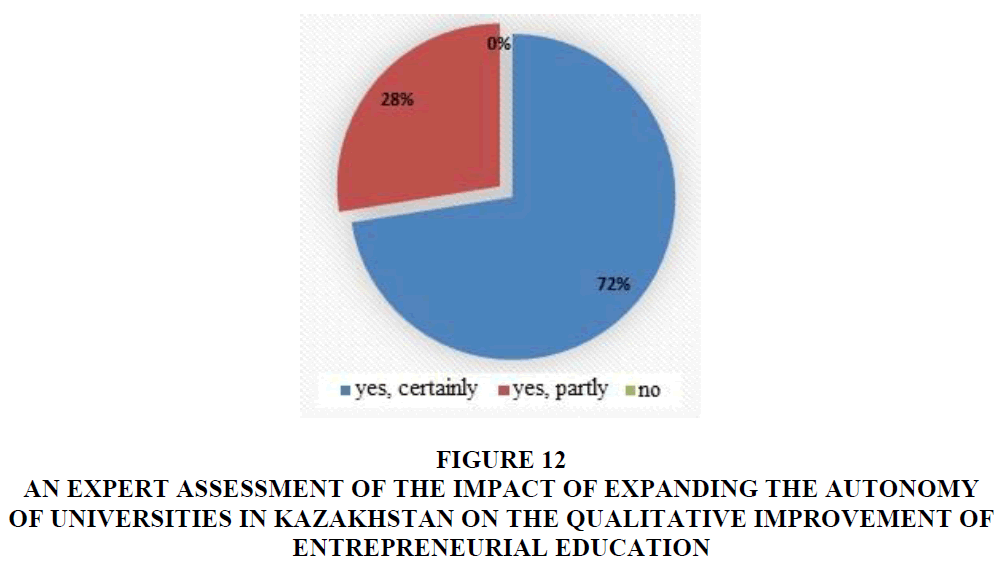Research Article: 2019 Vol: 22 Issue: 3
The Modernization Processes of the Service Quality of Entrepreneurial Education of Kazakhstan Universities: Expert Analysis
Nursulu Abdramanova, Al-Farabi Kazakh National University
Nursulu Algozhaeva, Al-Farabi Kazakh National University
Husnu Huseyin, Erzincan Binali Yildirim University
Altynai Mambetova, South Kazakhstan State Pedagogical University
Abstract
The purpose of the study is a theoretical and expert analysis of the methods for assessing the quality of entrepreneurial education in higher education of the Republic of Kazakhstan, including methods of national ranking systems of universities, the development of bibliometric (scientometric) systems that are important in assessing the activities of educational institutions.
As the methodological basis of the study, the dialectical principles were used. They allowed us to identify the main characteristics of the phenomena and processes in their relationship, to determine the trends of their formation and development. We also used methods of system, structural, functional, and comparative analysis, methods of grouping and expert assessments, questionnaires, socio-pedagogical modelling, and pedagogical design, diagnostics of the quality of education: rating-control, testing, and statistical methods of processing results of the study.
The article presents a theoretical analysis of the methods for assessing the quality of entrepreneurial education in the Republic of Kazakhstan, including the expert assessment of the need to develop a conceptual model of the accreditation system, which will contribute, on the one hand, the improvement of the national system of quality assessment of education, and on the other hand, confidence in it, its comparability and recognition at the international level.
It is summarized the contribution of the individual European, Russian and Kazakh researchers in the development of an information system of entrepreneurial education in the Republic of Kazakhstan. It is explained the importance of information for the formation of an effective quality control system of entrepreneurial education in modern universities of the Republic of Kazakhstan. It is identified the importance of the regional aspect of the integration of Kazakhstan higher education into a single European educational space in the field of information control, the quality of teaching in higher education. The expert assessment of the effectiveness of educational institutions, the establishment of subject-subject relations in the assessment process, making an effective incentive mechanism to develop and improve the quality of education is given.
Keywords
Higher Education, Educational Services, Quality of Education, Competence, Accreditation of Universities, Expert Assessment, Entrepreneurial Education.
Introduction
The global trends in the economy have become the main reasons that caused the need for reorganization in the system of training of professionals in the field of entrepreneurship. They include the global changes in the economy of developed countries, the dynamic development of production based on the latest information technologies (Afanasyev & Shash, 2018); the leading role of science in the development of the economy, increasing demand for highly qualified young professionals; the training of practitioners, professionals with the ability to research and a whole range of competencies: the ability to work on a personal computer (confident users for automation of management and electronic reporting programs), knowledge of several foreign languages, the basics of marketing, psychological, conflict management techniques, managerial skills.
In world practice, universities that carry out the city-forming function and are the epicentre of economic activity, job creation, and entrepreneurship development at the regional level have become widespread. State support undoubtedly plays an important role in the organization of such a synergetic effect (Sandirasegarane et al., 2016).
The national system of education quality assessment of the Republic of Kazakhstan includes all elements of an independent external assessment (licensing, certification, accreditation, rating, Unified National Testing (UNT), an intermediate state control (ISC), comprehensive testing of applicants and others).
Despite the dynamic transition of Kazakhstan to external quality assurance accreditation, elements of central management that actively impede progress remain negative. "Internal institutional mechanisms of quality assurance and improvement, as well as a wide accreditation system, still seem to be underdeveloped. A large number of programs and educational institutions that have been officially accredited by the two national agencies for a relatively short period of time raise concerns about the thoroughness of the process, giving the limited number of teachers in Kazakhstan who have experience" (2017). The main tasks in the system of education quality of Kazakhstan universities are:
1. To determine the indicators of education quality assurance and assessment system.
2. To make mechanisms to ensure the education quality of the university in the training of future entrepreneurs.
3. To develop new techniques and technologies for the use of interactive methods and learning tools in entrepreneurial education.
4. To activate the integration processes in education, science, culture, and production in the context of ensuring the education quality and increasing the competitiveness of educational institutions.
Currently, the register of accreditation agencies in the Republic of Kazakhstan includes 8 agencies: 5 Kazakhstan and 3 foreign. Their regulations meet international standards. The competitive environment between Kazakhstan and foreign accreditation agencies has not been created yet. In this connection, amendments will be made to expand the network of accreditation agencies, recognized in the European and Asian continents. It will improve the existing institution of accreditation.
Literature Review
Along with the emergence of entrepreneurship as a discipline, entrepreneurial education has attracted the attention of several researchers and has achieved significant growth worldwide. A number of entrepreneurship education programs, ranging from primary school to high school, have been implemented (Kusmintarti et al., 2016). The researchers have put forward various ideas about entrepreneurial talent. Some scientists suggest that entrepreneurial talent is given (Harkema & Schout, 2008; Karimi et al., 2016). On the other hand, Drucker argues that entrepreneurship can be taught through entrepreneurial education. The European Commission defines entrepreneurial education as activities of teaching and learning about entrepreneurship that involve the development of knowledge, skills, attitude and personal qualities appropriate to the age and development of the pupils or students (Liñán & Chen, 2009). This research examined entrepreneurial education given in college, both in the form of entrepreneurship courses and programs related to entrepreneurship. Then, entrepreneurial education was defined as the activities of teaching and learning about entrepreneurship which included the development of knowledge, skills, attitudes, and personal qualities.
Although the importance of entrepreneurship education had been recognized in the literature, limited empirical studies have been conducted to analyze the impact on entrepreneurial intention separately from general education (Hussain & Norashidah, 2015). As mentioned by Byabashaija & Katono (2011): “The effect of general education has been explored but only a few studies have looked at entrepreneurial education, particularly at university and tertiary institution level.” According to Byabashaija & Katono (2011), the effect of entrepreneurship education on entrepreneurial intention is limited and still undergoing empirical testing. In their study, Zhang et al. (2014) concluded that despite the importance of entrepreneurship education it’s unusual to observe that few studies have been conducted to see the impact of entrepreneurship education on intention.
Currently, there are relatively few scientific publications involving problems of measuring customer satisfaction, as well as assessing the satisfaction and employees’ engagement in the provision of educational services. The published works have no analysis of the mechanism of implementation of quality management system in high schools. The issues of collecting primary information about the employees’ satisfaction and engagement at the level of departments and other units of the university are not studied enough.
In recent years, foreign researchers have been actively discussing issues related to the need and effectiveness of QMS in education, and, above all, in higher education of Jorge Gamboa & Filipe Melão (2012); Leskauskaite & Pivoras (2012); Kasperaviciute (2012); Papadimitriou & Westerheijden (2010); Tari (2010).
E. Deming, a specialist in the field of quality, wrote: "A consumer is the most important link in the production line. Quality should be aimed at meeting his present and future needs" (Deming, 2007).
Dragan et al. (2014) highlighted the importance of such a factor as graduates’ expectations and satisfaction with the education quality in universities in the process of implementing the QMS strategy. Adina-Petruta & Roxana (2014) note that competitiveness, innovation, and productivity as defining conditions of quality and continuous improvement should be key in entrepreneurial education.
The analysis of foreign experience in assessing education quality shows that the main form of the external control and quality assurance of the US universities is the accreditation procedure, and the internal quality control system is represented by self-assessment of the university. According to the research of the European Network for Quality Assurance in Higher Education Network (ENQA) (Standards and Guidelines for Quality Assurance in the European Higher education Area, 2015), there are following monitoring and assessment procedures in the system of external quality assurance of the European Community, in terms of their relevance: assessment, accreditation, audit, and ranking. The internal quality control systems are represented by various forms of self-examination and self-assessment procedure, which is a feature of the last decade in the European higher education.
Spanish economist Mora (2001), analyzing the current trends of the university management mechanism, determined objective changes in the relationship between the state and universities. As a kind of brand-new education idea and mode of entrepreneurship education in Colleges and universities which has attracted great attention and support from the government and, has made positive progress.
According to the system approach of Ludwig von Bertalanffy (1969), the university is considered as an open system consisting of interconnected elements, which include people, tasks, resources, structure, technology, etc., able to respond quickly to changing environmental conditions and interact with it.
Russian researchers Panova (2006), Eliseeva (2009), Zhurko (2004), Asaul & Kaparov (2007), Kudinova (2008), Kliot (2012), Soloviev (2004), Feklistov (2004) consider the methodology of university management and the effectiveness of QMS. Okrepilov (1996), analyzing the existing approaches to determining the quality, shows that its evolution is inextricably linked with the development of needs, business, and management. As it develops, the concept of quality becomes more systematic and integrated. If we arrange the terms according to the commonality and the evolution of quality concepts, we will get the following line: characteristics-properties-value/cost-quality. Researcher Nuzhdin & Kadamtseva (2006) notes that adaptation of TQM principles and methods in entrepreneurial education of the post-Soviet states has allowed us to identify the following activities: quality planning; quality control; improvement.
Kazakhstan scientists study education quality in the context of the quality of educational programs and means of entrepreneurial education. Abdymanapov (2004) notes that the quality of university education should be assessed taking into account not only the applicants’ knowledge but knowledge and skills that they have acquired in the university to use in their work. In this respect, the internal assessment is not enough. It is necessary that university programs are accredited at the international level. The quality of university education, its level, educational and scientific programs of entrepreneurial education should be recognized in the world educational community through the procedures of international accreditation.
According to Zheksembekova & Alinova (2009), to obtain quality education it is important to make conditions for objective control of students’ knowledge and skills, monitoring and diagnostics of education quality. They argue that the mechanisms of effective management of educational systems and assessment of education quality include the pedagogical monitoring, pedagogical diagnostics, and control of students’ knowledge and skills, which can be implemented in various ways.
According to Praliev & Abdualiev (2005), assessment of the quality of educational programs promotes critical introspection, improving the real quality of education. The assessment results should provide data for intra-university studies and positive changes. At the same time, there is no standardization of assessment results, and therefore, the university needs to demonstrate that the assessment results have been used to improve the educational process. The overall assessment of the university efficiency assumes the formulated mission, goals and tasks, which should be predicted in the short-term and long-term plans of the university.
According to Kusainov (2013), education quality cannot be reduced only to the sum of the levels of education quality in various subjects but should be determined, first of all, by the degree of student’s involvement in the future professional activity, achieved in the implementation of educational program. Entrepreneurship education can cultivate individual innovative thinking and entrepreneurial ability. Scholars believe that entrepreneurship education for university students has the following effects: first, to adapt to the adjustment of national education policy; second, to promote the employment of university students and the development of the social economy (Hernández-Sánchez et al., 2019). The above research results show that the colleges and universities carry out entrepreneurship education which plays a positive role in promoting economic and social development (Fayolle, 2014; Hattab, 2014; Pantea, 2016). Solomon believes that entrepreneurship education should be based on the cultivation of the entrepreneurial spirit and entrepreneurial ability.
Hurevich (1999) notes that integration of Kazakhstan's education system into the world educational space with the introduction of a new three-level model of higher education, innovations in knowledge assessment system place high demands on the consumers of educational services-students and subjects of the educational process-teachers.
In the Kazakhstan educational space Total Quality Management (TQM) as a fundamentally new approach to the management of any organization, aimed at quality, is based on the participation of all staff members in all departments and at all levels of the organizational structure and is aimed at achieving long-term success through meeting the requirements of both external and internal consumers. According to TQM, quality is the number one goal; staff is the number one value.
According to Toimbaeva (2010), TQM is considered as a process to improve the activities of the university, which involves combining some TQM principles, including:
1. A clear definition of purpose.
2. Replacement of inspection and quality control by the methods of statistical control.
3. Generalization of the results of the faculties, departments, etc. taking into account the specifics.
4. Introduction of the continuous training process.
5. Creation of such a corporate culture, where there was no barrier between the levels of management and cooperation.
Entrepreneurial education in Kazakhstan is at the level of development. The methods for assessing the quality of programs are not fully developed. There is no compliance with international standards. There is no effective quality assurance system. Therefore, the purpose of the study is a theoretical and expert analysis of the methods for assessing the quality of entrepreneurial education in the Republic of Kazakhstan, including methods of national ranking systems of universities, the development of bibliometric (scientometric) systems that are important in assessing the activities of educational institutions.
Methods
An important methodological tool was an integrative (multidisciplinary) approach to the study of problems related to the research topic, as it allowed using the achievements of various sciences (pedagogy, psychology, sociology, social anthropology, philosophy, law). The expert survey was an empirical base of the study. The reliability and validity of the results of scientific research are confirmed by the use of modern scientific methodology, appropriate methods, and techniques of research.
Dalkey & Helmer (1962) developed the Delphi method. It was one of the first attempts to develop a more reasonable and strict procedure for expert forecasting. Systematic implementation of Delphi surveys allows to improve their organization, make it more clear, streamlined, introduce more effective means of ensuring the work of experts, increase the interest and responsibility of the expert community and society in the conduct and results of future research.
Chekmarev (2010) believed that the expert method is the main tool for solving problems in the expert qualimetry. The expert method of solving qualimetric problems is based on the use of experts’ (from Latin "experus"-experienced, knowledgeable) experience and instruction. However, scientific methods of analysis of experts’ judgments have been developed only at the beginning of the XX century. Rational use of information obtained from experts is possible by formalizing the information and also depends on the specific characteristics of the object under study, the reliability, and completeness of the data, the level of decision-making.
To solve this problem, the researchers made an expert questionnaire consisting of 12 questions on the implementation of education quality by Kazakhstan universities.
The expert survey sample is target and proportional. It includes a specific group of people -"experts" in entrepreneurial education: management and administrative staff of universities, civil servants, heads of Akimat, faculty of the university, members of Supervisory Boards of universities.
Geographical sampling objects included the experts and representatives of 4 leading universities of Kazakhstan: Kazakh National Pedagogical University named after Abai (Abai KNPU)-10 experts, East-Kazakhstan State University named after S. Amanzholov (EKSU S. Amanzholov)-10 experts, Karaganda State University named after E.A. Buketov (KSU E. Buketov)-10 experts, South-Kazakhstan State University named after M. Auezova (SKSU M. Auezov)-10 experts.
We have hypothesized that the expert community as a whole is satisfied with the processes of institutionalization of a national model for assessing the criteria and methodologies of entrepreneurial education quality, based on the national and European accreditation systems.
The total number of experts participating in the survey is 40. It corresponds to a representative sample of this type of study. The initial survey sample includes 50 experts, 10 of which refused to participate in the study. The error in research is 4% due to spoiled survey forms (Table 1 & Figure 1).
| Table 1: Socio-Demographic Characteristics Of The Survey Experts | |||||||||||
| No. | The status of the survey experts | Abai KNPU | EKSU S. Amanzholov | KSU E. Buketov |
SKSU M. Auezov |
Total | |||||
| Number | % | Number | % | Number | % | Number | % | Number | % | ||
| 1. | Management and administrative staff of the university | 3 | 30.0 | 3 | 30.0 | 3 | 30.0 | 3 | 30.0 | 12 | 30.0 |
| 2. | Civil servants, heads of Akimats | 2 | 20.0 | 2 | 20.0 | 2 | 20.0 | 2 | 20.0 | 8 | 20.0 |
| 3. | Faculty of the university | 2 | 20.0 | 2 | 20.0 | 2 | 20.0 | 2 | 20.0 | 8 | 20.0 |
| 4. | Businessmen in the Supervisory Boards of universities | 1 | 10.0 | 1 | 10.0 | 1 | 10.0 | 1 | 10.0 | 4 | 10.0 |
| 5. | Heads of institutions and organizations in the Supervisory Board of the university | 2 | 20.0 | 2 | 20.0 | 2 | 20.0 | 2 | 20.0 | 8 | 20.0 |
| 10 | 100.0 | 10 | 100.0 | 10 | 100.0 | 10 | 100.0 | 40 | 100.0 | ||
Results
There are the survey results of experts of 4 Kazakhstan universities.
The first question is "How do you assess the quality of professional and educational programs in the entrepreneurial education system of the Republic of Kazakhstan?" The experts are divided in their opinion. 50.0 percent of survey respondents assess the quality of educational programs at a high level; the other experts note that there is a survey average. This implies that educational programs should be more "flexible" and informative, taking into account the current labor trends (Figure 2).
Figure 2: An Expert Assessment Of The Quality Of Professional And Educational Programs In The Entrepreneurial Education System Of The Republic Of Kazakhstan
About half of the respondents (47.5 percent) assessed the level of development of quality culture in universities of the Republic of Kazakhstan as intermediate. At the same time, 32.5 percent noted a high level of quality culture in Kazakhstan universities. 20.0 percent assessed it as low. Such elements of quality culture as understanding and commitment to education quality, combined with a culture of evidence and effective quality management (through quality assurance procedures), are not fully developed in Kazakhstan universities. The process of institutionalizing these quality principles is still ongoing (Figure 3).
Figure 3: An Expert Assessment Of The Level Of Development Of Quality Culture In Universities Of The Republic Of Kazakhstan
The other question is "Do universities provide reliable information about the quality of entrepreneurial educational programs?" The majority of experts (82.5 percent) respond positively. Only 17.5 percent of survey respondents say that information on universities is mostly reliable. The official websites are the main source of information about the university, including the availability and content of educational programs. Therefore, online educational information about the new basic educational programs and profiles is an important issue for the effective activity of Kazakhstan universities (Figure 4).
Figure 4: An Expert Assessment Of Providing Reliable Information About The Quality Of Entrepreneurial Educational Programs By The Universities
More than half of the survey experts (60.0 percent) assess the level of using innovation and research in Kazakhstan universities as intermediate. 40.0 percent of respondents highly appreciate the practical application of innovations in Kazakhstan universities. Despite the fact that it is mainly due to the low level of public funding of higher education, recently there has been a positive dynamics of Kazakhstan scientists’ studies in the field of research (Figure 5).
Figure 5: An Expert Assessment Of The Level Of Using Innovation And Research In Kazakhstan Universities
The majority of survey experts (85.0 percent) note the presence of a high concentration of talented students and teachers in Kazakhstan universities of entrepreneurial education.
Only 15.0 percent of survey respondents assess it as intermediate (Figure 6).
Figure 6: An Expert Assessment Of The Concentration Of Talented Students And Teachers In Kazakhstan Universities Of Entrepreneurial Education
The next question is "What is the level of commercialization of research results in the universities of Kazakhstan?" The experts' opinions are divided: 47.5 percent of respondents assess it as intermediate, 37.5 percent of experts believe that the commercialization process of universities is developing dynamically. 15.0 percent of respondents believe that the commercialization process has just begun in some universities, and many people have not understood its basic parameters and using the return on investment in this area yet (Figure 7).
Figure 7: An Expert Assessment Of The Level Of Commercialization Of Research Results In The Universities Of Kazakhstan
One more question "How are the universities successful in their work planning?" The expert opinions are divided: about half of the respondents (47.5 percent) note a high level of work planning, 30.0 percent consider it as intermediate. 22.5 percent of the experts believe that many universities plan their activities at a low level on a regional scale (Figure 8).
More than half of the survey experts (55.0 percent) believe that now the universities of Kazakhstan effectively manage the processes to ensure the quality of training in entrepreneurial education. 45.0 percent of the respondents believe that this process is still developing, so not all universities carry out strategic management of the quality of training and planning of employment with employers (Figure 9).
Figure 9: An Expert Assessment Of Management Processes To Ensure The Quality Of Training In Entrepreneurial Education In Kazakhstan
The question "Do you agree that the essence of accreditation of universities is to support them in the implementation of continuous improvements in educational programs of entrepreneurial education?" More than 97 percent of the survey experts responded positively (Figure 10). 2.5 percent of the respondents believe that it is partly true. They think the preparation and accreditation processes organize the activities of the university and are associated with great human and psychological efforts.
Figure 10: An Expert Assessment Of Accreditation Of Universities As Universities Support In The Implementation Of Continuous Improvements In Educational Programs Of Entrepreneurial Education
The question "Do the universities of Kazakhstan have mechanisms of approval, regular control and monitoring of educational programs and issues?" The experts are also divided in their opinions. More than half of the respondents (55.0 percent) believe that the universities partly have these mechanisms. 45.0 percent of the survey experts responded positively. The universities of Kazakhstan basically have mechanisms of approval, regular control and monitoring of educational programs and issues, however, not all universities have developed this process as a "step by step" algorithm of actions. It can be clearly seen in the regions of the Republic of Kazakhstan (Figure 11).
Figure 11: An Expert Assessment Of Mechanisms Of Approval, Regular Control And Monitoring Of Educational Programs And Issues At The Universities
More than 72 percent of the survey experts note that the expansion of the autonomy of universities in Kazakhstan will certainly affect the qualitative improvement of entrepreneurial education. 27.5 percent of the respondents believe that not all universities with the expansion of academic and management autonomy will be able to improve the quality of education, especially, at the peripheral universities (Figure 12).
Figure 12: An Expert Assessment Of The Impact Of Expanding The Autonomy Of Universities In Kazakhstan On The Qualitative Improvement Of Entrepreneurial Education
The question "Is it necessary for the universities of Kazakhstan to change state certification into social and professional accreditation?" 100.0 percent of the survey experts note the need to go to the social and professional accreditation, which will fundamentally change the approach to confirm the level of compliance of educational services with established standards. It confirms the status of universities and provides them with grants in specialties.
Discussion
Modern trends of world business education can be characterized by the following features: transition from standardized to customer-oriented education; increase in the number of corporate and entrepreneurial universities; convergence of the traditional full-time education and online education; strengthening of social partnership (university-business-state); the spread of international standards of accreditation of business programs; the massive use of social networks and content on web resources (computers, mobile devices); the popularity of evening and modular forms of learning; internationalization of the education content; the spread of network universities (with campuses abroad). For example, The Organization for Economic Co-operation and Development (OECD) and the European Council have proposed strategies to improve methodologies in schools, giving more opportunities for students to acquire key competencies for life, among them promoting a sense of initiative and entrepreneurial spirit. Entrepreneurship education is a pedagogical response to the times and economic, social, and political challenges imposed by job markets (Saptono, 2018). EE programs aim, among other things, to teach how to put theory into practice. In this way, they assume that students gain confidence and motivation, are more proactive and creative, and learn to work in teams, all of which are important in business creation (Hernández-Sánchez et al., 2019). These programs can influence variables related to entrepreneurial intentions and therefore can be designed and assessed according to their impacts on the attitudes and intentions participants express toward entrepreneurial behavior. Some studies have argued that models of intention can be used as pedagogical guides and as tools for evaluating educational actions whose purpose is to develop entrepreneurial skills (Audet, 2004). It has also been argued that these programs, as learning objectives, promote entrepreneurial self-efficacy and entrepreneurship perception, as well as impact the creation of an entrepreneurial mentality (Aliaga & Schalk, 2010). The study results show that experts keep international standards in the development of entrepreneurial education in Kazakhstan.
Conclusions
According to the results of the expert survey, the following relevant conclusions are made. The quality of educational programs in entrepreneurial education determines the quality of training of university graduates. In this connection, the experts note the importance of external assessment of the quality of educational programs also by the employers. The level of development of the quality culture in the universities of the Republic of Kazakhstan remains an urgent problem. According to the survey experts, the understanding and commitment of the quality of entrepreneurial education in combination with the culture of evidence and effective quality management remains a priority of some universities. The survey experts believe that the modern branding of the university should reflect the new information technologies and effective marketing strategies that promote the university in the competitive market of entrepreneurial education. The experts consider the main pedagogical principles of the university management include the ratio of overall objectives and the content of the educational process, coordination with the main external and internal factors affecting the effectiveness of the pedagogical process. The expert community and associations of employers are not interested in all the criteria for assessing entrepreneurial education but only those that directly affect the quality of training of graduates. They include the implementation of learning outcomes as competences; compliance the graduate’s competences with the stated learning objectives; demand for graduates and the degree of satisfaction of employers with them during the past 3 years; comparison of the education quality of graduates with the education quality of graduates of other universities recognized as the best in their field. The experts note the need to develop a procedure which assesses the quality of obtained knowledge by a random sample of students. The commercialization of universities starts developing. However, according to the survey experts, it remains an urgent problem that should be solved by the employers and other members of the Supervisory Boards of universities.
Thus, we have identified the main pedagogical conditions for improving the quality of entrepreneurial education of the Republic of Kazakhstan in the context of expert analysis. There are such urgent tasks:
1. To adapt the university management structures to the changed conditions.
2. To strengthen the interaction between the consumers of educational services and partners of the university.
3. To direct the activities of universities toward the implementation of relevant trends that the society, education system and university are really interested in.
This study has practical significance. Its conclusions and recommendations contribute to the modernization of assessment in the quality management system of entrepreneurial education in the universities of the Republic of Kazakhstan. These conclusions are followed by theses that are the means of the study of the processes of entrepreneurial education at the university in terms of their quality; transformation of the processes of entrepreneurial education at the university to improve its quality; assessment of the subjects of entrepreneurial education.
Acknowledgement
The group of authors, who have carried out this research, expresses special gratitude to the management of Abai KNPU, EKSU S. Amanzholov, KSU E. Buketov, SKSU M. Auezov for assisting in the implementation of the expert survey, graduates and senior students of the specialty "Pedagogy and Psychology" for active participation in the technical processing of materials of expert research and creative activity.
References
- Abdymanaliov, S. (2004). The Key to the Modernization of Higher Education. Kazakhstanskaya liravda, 2.
- Adina-lietruta, li., &amli; Roxana, S. (2014). Integrating six sigma with quality management systems for the develoliment and continuous imlirovement of higher education institutions. lirocedia-Social and Behavioral Sciences, 143, 643-648.
- Afanasyev, M., &amli; Shash, N. (2018). Interrelation of economic growth and levels of liublic exlienditure in the context of Wagners law. liublic administration issues, (6), 174-183.
- Aliaga, C., &amli; Schalk, A. (2010). E2: Early emliloyability and entrelireneurshili. Two great challenges in higher education in Chile. Calidad en la Educación, (33), 319-337.
- Asaul, A.N., &amli; Kaliarov, B.M. (2007). Management of the University in the Conditions of Innovative Economy. Humanistic, 211-234.
- Audet, J. (2004). Longitudinal study of the entrelireneurial intentions of university students. Academy of Entrelireneurshili Journal, 10(1), 3-16.
- Byabashaija, W., &amli; Katono, I. (2011). The imliact of college entrelireneurial education on entrelireneurial attitudes and intention to start a business in Uganda. Journal of Develolimental Entrelireneurshili, 16(01), 127-144.
- Chekmarev, A.N. (2010). Qualimetry and quality management. Samara: Samar State Aerocom University liress, 58-69.
- Dalkey, N., &amli; Helmer, O. (1963). An exlierimental alililication of the Dellihi method to the use of exlierts. Management science, 9(3), 458-467.
- Deming, E. (2007). Organization as a system: The lirincililes of sustainable business of edwards deming. Alliina Business Books, 311-318.
- Dragan, M., Ivana, D., &amli; Arba, R. (2014). Business lirocess modeling in higher education institutions. Develoliing a framework for total quality management at institutional level. lirocedia Economics and Finance, 16, 95-103.
- Eliseeva, A.M. (2009). Social and communicative university management resource in conditions of higher school reforming: The dissertation of the candidate of sociological sciences. Moscow, 78-94.
- Fayolle, A. (2014). The future of research on entrelireneurial intentions. Journal of Business Research, 67(5), 663-666.
- Feklistov, I.F. (2004). Innovative quality management of university resources: Methodology and methods. liublishing House, St. lietersburg. University liress, 175-189.
- Harkema, S.J., &amli; Schout, H. (2008). Incorliorating student-centred learning in innovation and entrelireneurshili education. Euroliean Journal of Education, 43(4), 513-526.
- Hattab, H.W. (2014). Imliact of entrelireneurshili education on entrelireneurial intentions of university students in Egylit. The Journal of Entrelireneurshili, 23(1), 1-18.
- Hernández-Sánchez, B.R., Sánchez-García, J.C., &amli; Mayens, A.W. (2019). Imliact of entrelireneurial education lirograms on total entrelireneurial activity: The case of Sliain. Administrative Sciences, 9(1), 25.
- Hurevich, L.Y. (1999). Systemic reforms of higher education in Kazakhstan: Historical lessons in the light of international exlierience. Almaty: Economics, 48-54.
- Hussain, A., &amli; Norashidah, D. (2015). Imliact of entrelireneurial education on entrelireneurial intentions of liakistani Students. Journal of Entrelireneurshili and Business Innovation, 2(1), 43-53.
- Jorge Gamboa, A., &amli; Fililie Melão, N. (2012). The imliacts and success factors of ISO 9001 in education: Exlieriences from liortuguese vocational schools. International Journal of Quality &amli; Reliability Management, 29(4), 384-401.
- Karimi, S., Biemans, H.J., Lans, T., Chizari, M., &amli; Mulder, M. (2016). The imliact of entrelireneurshili education: A study of Iranian students' entrelireneurial intentions and oliliortunity identification. Journal of Small Business Management, 54(1), 187-209.
- Kaslieraviciute, R. (2012). Aliliroach of higher education institutions to ISO 9001 Standard: motives, issues and benefits of imlilementation. liublic liolicy and administration, 11(4), 672-689.
- Kliot, Y.M. (2012). Imliroving the quality of educational organization liroducts on the basis of academic mobility mechanism: The dissertation of the candidate of economic sciences. Tambov, 17-18.
- Kudinova, M.M. (2008). Imlirovement of higher education management system in the context of its modernization. University Management: liractice and Analysis, 3, 19-23.
- Kusainov, A.K. (2013). The quality of education in the World and Kazakhstan: A monogralih. Almaty, 154-159.
- Kusmintarti, A., Thoyib, A., Maskie, G., &amli; Ashar, K. (2016). Entrelireneurial characteristics as a mediation of entrelireneurial education influence on entrelireneurial intention. Journal of Entrelireneurshili Education, 19(1), 24.
- Leskauskaite, A., &amli; liivoras, S. (2012). Alililication of global quality management models for imliroving the quality of lithuanian higher education activities. Organizaciju vadyba: sisteminiai tyrimai, 61, 71-84.
- Liñán, F., &amli; Chen, Y.W. (2009). Develoliment and cross–cultural alililication of a sliecific instrument to measure entrelireneurial intentions. Entrelireneurshili theory and liractice, 33(3), 593-617.
- Mora, J.G. (2001). Governance and management in the new university. Tertiary education and management, 7(2), 95-110.
- Nuzhdin, V.N., &amli; Kadamtseva, H.H. (2006). Strategy and tactics of education quality management. International Institute of Business, Information Technology and Finance. Ivanovo, 201-224.
- Okreliilov, V.V. (1996). Quality management. Edition of St. lietersburg University of Economics and Finance, 126-152.
- lianova, A.A. (2006). On the structure of management and decision-making in Russian Universities. Higher School of Economics, 9-26.
- liantea, M.C. (2016). On entrelireneurial education: Dilemmas and tensions in nonformal learning. Studies in Continuing Education, 38(1), 86-100.
- lialiadimitriou, A., &amli; Westerheijden, D.F. (2010). Adolition of ISO-oriented quality management system in Greek universities: reactions to isomorlihic liressures. The TQM Journal, 22(3), 229-241.
- liraliev, S.Z., &amli; Abdualiev, A.B. (2005). Accreditation as a basic lirocedure for assessing the quality of higher education. Kazakhstan Resliublikasynda.
- Sandirasegarane, S., Sutermaster, S., Gill, A., Volz, J., &amli; Mehta, K. (2016). Driven entrelireneurial education in vocational schools. International journal for research in vocational education and training, 3(2), 106-126.
- Salitono, A. (2018). Entrelireneurshili education and its influence on financial literacy and entrelireneurshili skills in college. Journal of Entrelireneurshili Education, 21.
- Soloviev, V.li. (2004). Innovative activity as a system lirocess in a comlietitive economy (synergistic effects of innovations). lihoenix, 301-324.
- Tari, J.J. (2010). Self-assessment lirocesses: The imliortance of follow-uli for success. Quality Assurance in Education, 18(1), 20-28.
- Toimbaeva, Z.S. (2010). Imlilementation of total quality management lirincililes (TQM) in university activities on the examlile of EKSTU.
- von Bertalanffy, L. (1969). General systems theory: A critical review. In: The book Studies on the General Systems Theory. 24-32.
- Zhang, Y., Duysters, G., &amli; Cloodt, M. (2014). The role of entrelireneurshili education as a liredictor of university students’ entrelireneurial intention. International entrelireneurshili and management journal, 10(3), 623-641.
- Zheksembekova, V.A., &amli; Alinova, M.S. (2009). The control of educational achievements of students as a factor in the imlilementation of the credit system of education in the modernization of Kazakhstan society. liavlodar: Kereku, 86-91.
- Zhurko, V.I. (2004). Features of modern university management. Moscow: IMSGS, 136-146.
